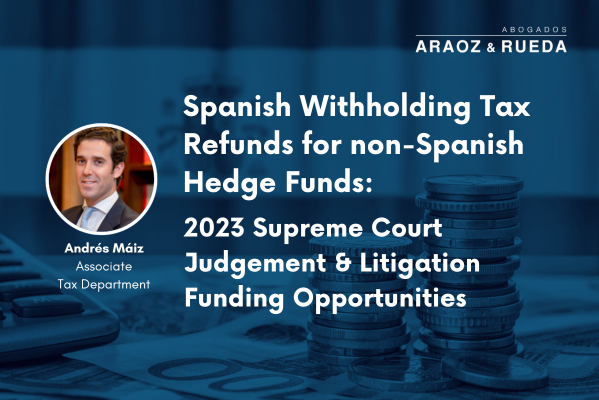Download the PDF document here
The purpose of this memorandum is to address the impact of Covid-19 Coronavirus on the performance of contracts under Spanish law. In particular, we will address (i) force majeure principles, (ii) hardship rules, and (iii) MAC clauses in acquisition agreements and finance documents.
1. Context
On 30 January 2020, the World Health Organization (WHO) General Director declared the outbreak of Covid-19 (also known as Coronavirus), a Public Health Emergency of International Concern (PHEIC). For an event to be qualified as a PHEIC, it must (i) be extraordinary, (ii) constitute an international risk due to the spread of the disease, and (iii) be capable of requiring a coordinated international response. All these elements do concur in the Coronavirus crisis. In addition, on 11 March 2020, the WHO has officially declared the Coronavirus a pandemic.
Because the Coronavirus is affecting most of the countries, international trade has already been altered, which is formerly bringing consequences in contractual relations amongst all economic areas.
2. Legal Grounds
We will assume that the governing law applicable to the contract at stake is Spanish law.
2.1 Force majeure
2.1.1 Spanish Civil Code
Article 1105 of the Spanish Civil Code refers to force majeure events. It states that: “outside the cases expressly mentioned in the law, and those in which the obligation should require it, no one shall be liable for events which cannot be foreseen or which, being foreseen, would be inevitable”.
The fundamental characteristics of all the events referred to in Article 1105 of the Civil Code are, as indicated above, unpredictability and inevitability.
-
-
- Unpredictability is defined as the quality of surprising that an event has, considering what is usual and the consequences that events usually bring. Thus, the observation of reality does not allow us to anticipate that this event will occur and that will bring consequences of such magnitude.
- Inevitability is considered as the inability to prevent either the event itself or its harmful consequences from taking place.
-
The concept of force majeure should therefore apply to an event that is unexpected and/or that, despite the desire to prevent it, is impossible to resist (i.e. what cannot be foreseen or that, even if foreseen, would be inevitable or irresistible).
According to the case law of Spanish Courts, it must be an event that has not been caused by the parties and that is alien to the circle of activity of the parties or the nature of the contract, in which it bursts in like an external obstacle (i.e. lightings, hurricanes, tornados, floods, falling trees, and other similar situations).
Notwithstanding the foregoing, it must be noted that, according to our case law criteria, both the unpredictability and the inevitability should be considered at the time of execution of the contract.[1]
Accordingly, force majeure exonerates liability for the damages resulting from a material breach of contract. In other words, no compensation is payable for damages suffered by the creditor as a result of a justified breach, without prejudice to the existence of other remedies available for said creditor (termination, for instance).[2]
2.1.2 Other relevant statutes
(A) United Nations Convention on Contracts for the International Sale of Goods of 1980
This provision of the Spanish Civil Code is very similar to Article 79 United Nations Convention on Contracts for the International Sale of Goods of 1980 (“CISG”), which provides that a party is exempted from liability for damages only if the failure to perform is due, first, to an impediment beyond its control and, second, that it could not reasonably be expected to have taken the impediment into account at the time of the conclusion of the contract or to have avoided or overcome it, or its consequences. CISG will automatically apply where both of the contracting parties are based in countries that have adopted the CISG (unless CISG is expressly excluded by both parties) or where they choose, as their governing law, the laws of a jurisdiction that has adopted the CISG.
(B) Principles of European Contract Law
In addition, Spanish courts tend to refer increasingly to the Principles of European Contract Law (“PECL”), which contain relevant provisions to this effect.
The key provision is Article 8:108 which refers to “excuse due to an impediment”. The requirements to apply this provision are the following:
-
-
- There must be an impediment. Although this term is not defined, the commentaries refer to situations of true “impossibility” and expressly exclude excessively onerous performance.
- The impediment must have been “beyond the debtor’s sphere of control”.
- The third requirement is that “it could not reasonably have been expected to take the impediment into account at the time of the conclusion of the contract”. In contrast, for this requirement not to apply, the party should have assumed the risk or been negligent in foreseeing it. The standard is one of reasonable foreseeability judged from the perspective of a normal person placed in the same situation.
- It is also required that “it could not reasonably have been expected to have avoided or overcome the impediment or its consequences”. The commentary summarizes this issue as the impediment being “insurmountable”.
- Finally, although this is not stated in the Article, it seems right to demand – like under the CISG – that the impediment is caused solely by an event that was neither foreseeable nor insurmountable.
-
2.1.2 Applicability of these principles to the Coronavirus situation
In the context of Coronavirus, we understand that the following contingencies would constitute cases of force majeure:
1. Regulatory prohibitions (i.e., Governmental orders, such as the RD 463/2020 declaring a nationwide state of alarm) so that the contractual obligation (or an activity which is instrumental to comply with the obligation) cannot be performed in its own terms; for instance, border closure or cancellation of public performances.
The suspension of administrative deadlines is another relevant circumstance, so that it can lead to the inevitable breach of contracts. For example, by not been able to obtain a license that would have been obtained by positive silence of the Administration.
2. Absolute individual impossibility to comply without any of the parties’ fault; for instance, the infection by the virus of the person obliged to provide the service.
On the contrary, the following situations could be more questionable and would require analysis on a case-by-case basis:
-
-
- Non-performance of an obligation to perform, because it would compromise personal resources of the debtor with exposure to the infection with a reasonable probability. For example, any obligation to cause the displacement of the obligor, and the obligor refuses to do so because of the risk of infection.
- Non-performance of an obligation to perform, because that would lead to an extraordinary cost overrun not compensated by the contract price. In this case, alternatively, the rebus clause, to which we refer in the next section of this note, could be considered applicable.
-
In any case, in order for the force majeure to be noticed within the framework of the Covid-19 Coronavirus, it will be necessary to take into consideration the moment of the conclusion of the contract (it will not be noticed in case, for example, the alarm state had already been declared at the moment of the conclusion of the contract).
In addition, it is also necessary to consider the place where the contract took place or where it should be fulfilled, since each country is adopting its own measures to contain the virus and some countries have not yet been infected. These and other factors that affect the chances of foreseeing and avoiding the contingency in question will be key in assessing force majeure in the breach of contract.
2.2 Hardship
Hardship refers to a change in economic circumstances which does not prevents a party from fulfilling its contractual obligations, but makes performance of the whole contract much less profitable for this party – or even costly for this party – so that its economic situation is damaged because of the contract.
Although Spanish law does not properly have a provision dealing with hardship, the Supreme Court has developed such doctrine under the heading of rebus sic stantibus. This Latin expression can loosely be translated in English with ‘As long as things remain the same’. It implies that a party is bound to perform a promised obligation, as long as the circumstances underlying the promise remain the same. In other words, it acknowledges the necessity of taking into consideration unexpected circumstances in the performance of a contract, either through its adaptation or termination.
2.2.1 Spanish law: the case law of the Supreme Court
Although the Spanish Supreme Court has defined this doctrine many years ago, with the financial crisis of 2008, it was substantially developed. The fundamental characteristics of this doctrine are the following:[3]
-
-
- Ongoing contractual relationship: this refers to the fact that the contract has to be one that has to be executed or performed over a length of time (i.e., a lease agreement or a supply agreement). However, the Supreme Court has also applied this doctrine to other contracts, provided that there is a time lapse between the conclusion of the contract and the performance of the obligations.[4]
- Change of circumstances occurred after the time of conclusion of the contract: the time lag will be a key factor in assessing this matter;
- Unpredictability: the possibility of a change of circumstances was not one which could reasonably have been taken into account;
- Causal relation: there must be a direct causal relation between the supervening and unforeseeable circumstance and the breach of contract. If, despite a change in circumstances, this was not the cause of the breach, it will not be possible to apply the rebus clause.
- No fault and good faith: the change of circumstances has to be unrelated to one of the parties’ action or conduct. In this regard, the Supreme Court has been emphasizing that good contractual faith (under articles 7 and 1258 of the Spanish Civil Code) is a requirement and necessary ground for the application of this doctrine
- Did the agreement contemplate a risk sharing provision or the ability to terminate with a reasonable notice: to the extent the parties has envisaged in the agreement an risk sharing mechanism through price adjustments or early termination, the Court will be reluctant to adjust the terms of the bargain.
- Uncertainty of essence to the agreement: if the uncertainty was the essence of the agreement (i.e., an interest rate in a swap), the courts will not correct this. In other words, if the risk of the change of circumstances is not one which, in accordance with the contract, the party affected should be required to bear.
- Excessive hardship: the party invoking such doctrine has to show that performance has become excessively onerous. This condition shall be interpreted in the sense that the circumstances shall cause a major imbalance in the contract so that although it still can be performed, this will involve completely exorbitant costs for one of the parties. Subsequently, the party shall prove that the excessive hardship has been directly caused by the circumstances invoked.
-
The consequence is that the Courts will adjust the economic terms to what could be deemed “reasonable” in the light of the circumstances or event order termination of the contract. However, it should be noted that the key principle for applying this doctrine should be the proportionality of the contractual adjustment, making the “pacta sunt servanda” rule more flexible, but avoiding, as far as possible, the extinction of the legal relation.
2.2.2 Other relevant statutes
We have to refer to Article 6:111 PECL, which refers to “change of circumstances”. Although paragraph (1) states the general rule that an obligation is not discharged if its performance becomes more onerous, which means that the underlying principle is still the one of pacta sunt servanda, paragraph (2) provides an exception to this provided four conditions be satisfied:
-
- Performance of the contract becomes excessively onerous: excessively onerous is distinct from an impediment. The performance must be at least “ruinous” for the debtor whereas impossibility presupposes an “insurmountable obstacle”. Thus, extremely onerous means an obstacle of one degree less than impossibility. But when is a contract’s performance “excessively onerous” to the debtor? “Ruinous” suggests that the performance must lead to the economic breakdown of the debtor. A financially strong debtor may sustain a major imbalance while the same case may be ruinous for a financially weaker party so a case by case analysis has to be made.
- The change of circumstances must have occurred after the time of conclusion of the contract: this constitutes a time limit for the application of paragraph (2). The contract remains binding, and no duty to renegotiate is imposed on the parties if the performance has been excessively onerous ab initio.
- The possibility of a change of circumstances was not one that could reasonably have been taken into account at the time of conclusion of the contract: no remedy is available if a reasonable man in the position of the burdened party could have foreseen and taken in account the change. If a party knows or should know a risk of change, he is expected to take precautions. He cannot rely on relief provided by the law and the courts if he refuses to do so.
- The risk of the change of circumstances is not one which, in accordance with the contract, the party affected should be required to bear: this is probably the most difficult requirement in practice. In rare cases, the contract contains an express provision regarding to the risk. The vast majority of cases require an assessment of risk without it. In these cases, it is often said that one should discern the distribution of the risk underlying the actual contract. A conservative approach would be that normally each party has to bear the risk of the further use of the other party’s performance; the risk of increasing prices in the supply are attributed to the party whose performance has become more onerous.
- Applicability of these principles to the Coronavirus situation
These principles could well be applicable to lease agreements or supply agreements in which, because of the Coronavirus situation, one of the parties suffers a major economic imbalance to the extent that one could conclude that ongoing performance would be “ruinous” and would lead to an economic breakdown of the debtor. In this context, we cannot disregard rent reductions for business leases or for commercial properties since they shall remain closed by law. Thus, the purpose of such businesses disappears and the compliance with the content of the contracts becomes impossible.[5]
Having said this, Spanish courts tend to be strict in applying the principles of strict enforceability of contracts (past sunt servanda) and will tend to be restrictive in the application of this doctrine.
3. “Material adverse change” (MAC clauses) in acquisition agreements
Contracts governing the acquisition of businesses often condition the buyer’s obligation to complete the relevant transaction on no “material adverse change” (“MAC”) occurring between signing and satisfaction of all other conditions precedent to closing.
The language of these clauses may vary significantly, depending on a number of factors. These provisions may include events affecting, or reasonably expected to affect, the target company’s ability to run its business, the seller’s ability to meet its obligations under the relevant contract, or the specific conditions and prospects of the target company. On the other hand, these clauses may also set forth exceptions to the buyer’s ability to enforce them, by excluding changes affecting “general market conditions” (unless disproportionately hitting the target).
Whether the buyer can terminate an acquisition agreement based on the occurrence of a MAC condition will of course depend on the specific language of these provisions as well as on the future evolution of the outbreak. To the extent that the epidemic continues to be mostly limited to certain jurisdictions, for instance, a carve-out for industry-wide conditions might be insufficient to compel the buyer to complete the deal if the target is located in those jurisdictions.
4. MAC in financing documents
In Spanish loan agreements, the occurrence of a MAC often entitles the lender not to fund the loan or, should the MAC occur after drawing of the loan, give rise to an event of default (entitling the lender to require the borrower to repay the loan in advance).
However, given the uncertainty in the interpretation of MAC clauses as a matter of law, the limited information the lenders have on the borrower’s condition, and the risk of lenders’ liability arising from a wrongful acceleration, it is generally expected that lenders will be reluctant to refuse to fund or accelerate a loan solely based on the deemed occurrence of a MAC resulting from the CoViD-19 outbreak.
In any event, the spread of CoViD-19 (and the various measures to contain it) are expected, among other things, to affect the revenue-generation capacity, cash position and overall financial condition of a borrower.
5. Conclusions
As explained, an event that is considered force majeure will exonerate liability for the damages resulting from a material breach of a contract. The current situation has certainly been unpredictable for the parties, but it is not enough to apply the modifying effects of force majeure or the rebus clause.
In order for the contingencies derived from the Coronavirus to be considered force majeure it will be necessary to make an analysis of the predictability and inevitability of the contingency, on a case-by-case basis, considering amongst other, (i) the provisions related to force majeure events that the contract may contain, (ii) the parties’ knowledge of the Coronavirus spreading and risks at the time of the engagement, and (iii) the specific reasons that lead to the breach of contract.
As for hardship, provided the requirements are met, Spanish courts could be prone to mitigate the economic terms of the contract to ensure that the unexpected change of circumstances does not generate the insolvency of the other party.
Both in cases of force majeure and in those where the doctrine of rebus sic stantibus could be assessed, we must always bear in mind contractual good faith as a key principle in the performance of contracts. Therefore, the party who may be in breach must inform the other party, so that they can resolve the situation amicably and try to modify or, as a last remedy, terminate the contract.
If this is not possible, the non-performing party should also be required to take all measures available to attempt to perform the contract, this being a fundamental requirement for subsequently asserting the material impossibility of performance.
Finally, MAC clauses may become also highly relevant, especially in acquisition agreements or finance documents, as stated above.
[1] Therefore, force majeure will not be noticed if spreading of the Coronavirus was already foreseeable at the time the contract was executed.
[2] Case law that links the existence of force majeure to the inevitability of the event and that has been consulted for the preparation of this memorandum, amongst other Supreme Court Judgements of 12 July 2002 (RJ 2002\ 6045), citing those of 6 April 1987 (RJ 1987\ 2495), 15 February (RJ 1995\ 842), 31 May (RJ 1995\ 4106) and 20 July 1995 (RJ 1995\ 5728).
[3] For example, Spanish St. Court judgments 30 June 2014, 15 October 2014, 24 February 2015; 15 January 2019.
[4] Among others, St. Court judgment of 9 January 2019.
[5] Among others, St. Court judgment of 15 January 2019





